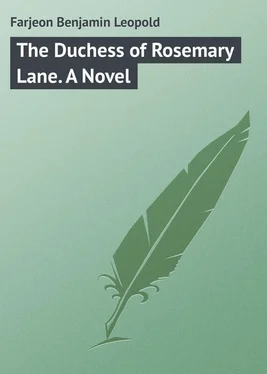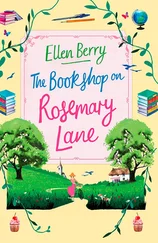Benjamin Farjeon - The Duchess of Rosemary Lane. A Novel
Здесь есть возможность читать онлайн «Benjamin Farjeon - The Duchess of Rosemary Lane. A Novel» — ознакомительный отрывок электронной книги совершенно бесплатно, а после прочтения отрывка купить полную версию. В некоторых случаях можно слушать аудио, скачать через торрент в формате fb2 и присутствует краткое содержание. Жанр: foreign_language, foreign_prose, на английском языке. Описание произведения, (предисловие) а так же отзывы посетителей доступны на портале библиотеки ЛибКат.
- Название:The Duchess of Rosemary Lane. A Novel
- Автор:
- Жанр:
- Год:неизвестен
- ISBN:нет данных
- Рейтинг книги:3 / 5. Голосов: 1
-
Избранное:Добавить в избранное
- Отзывы:
-
Ваша оценка:
- 60
- 1
- 2
- 3
- 4
- 5
The Duchess of Rosemary Lane. A Novel: краткое содержание, описание и аннотация
Предлагаем к чтению аннотацию, описание, краткое содержание или предисловие (зависит от того, что написал сам автор книги «The Duchess of Rosemary Lane. A Novel»). Если вы не нашли необходимую информацию о книге — напишите в комментариях, мы постараемся отыскать её.
The Duchess of Rosemary Lane. A Novel — читать онлайн ознакомительный отрывок
Ниже представлен текст книги, разбитый по страницам. Система сохранения места последней прочитанной страницы, позволяет с удобством читать онлайн бесплатно книгу «The Duchess of Rosemary Lane. A Novel», без необходимости каждый раз заново искать на чём Вы остановились. Поставьте закладку, и сможете в любой момент перейти на страницу, на которой закончили чтение.
Интервал:
Закладка:
Animated by an impulse of humanity, he hastens to her; he bends over her; his hand touches her cheek as he puts aside a curl of brown hair which the light breeze has blown across her face.
"Good God!" he cries. "It is Nelly!"
Is it pity, or fear, or annoyance, that is expressed in him? No man, seeking to know, could answer the question at this moment, for a cloud Obscures the moon, and throws darkness on his face.
He hears voices in the near distance. The speakers are almost upon him. He starts from his stooping posture with a look of alarm, and retreats to a safe shelter, where he can see and not be seen.
The voices proceed from two women and two men. One of the men is the young gardener; the other is a doctor, whom John has brought to the assistance of the girl he loves.
The doctor kneels by the side of the insensible girl, and raises her in his arms.
"She lives," he says, almost immediately.
"Thank God!" exclaims John.
Stronger evidence of life is given by Nelly herself. She moans and writhes in the doctor's arms.
The young gardener has two warm rugs with him. The doctor looks at him inquiringly.
"You are her husband?"
"No."
The doctor frowns.
"You had best retire, then. Place those wraps here. Stay-you must do something. Go to my house as quickly as you can, and bring- No, there might be some difficulty. I will write what I want."
With Nelly's head still lying on his knee, he takes from his pocket a book, writes instructions upon a leaf, tears it out and gives it to the gardener.
"Do not delay," he says. "You and my man must bring the couch and the blankets at once. There's not a moment to lose."
John darts away, and the doctor beckons the women to him, and whispers gravely to them.
Mr. Temple, in his retreat, clasps his hands, and listens. For what? He cannot hear a word that passes between the women and the doctor, and their forms shut Nelly from his sight. But presently a sound reaches his ears that makes him tremble. It is a baby's cry. Another soul is added to the world's many. In the stillness of the beautiful night, while the snow is falling upon the ancient church and on the tombs of the dead who worshipped there, a child is born, and the mother's sharpest physical agony is over.
Part the First. THE CHILD
CHAPTER I
As in a theatre, after the overture is played, the first thing shown to the audience is the scene in which the action of the drama commences, so let our first words be devoted to the locality in which the story opens.
I doubt whether the pretty shrub from which Rosemary Lane derived its name was ever seen in the locality, or whether, being seen, it would have been recognised as a familiar sign. Rosemary has a peculiarly sweet odour; Rosemary Lane had not. In one sense there was fitness in the name; for as the flower of rosemary has frequently been used as an emblem of constancy and fidelity, so in Rosemary Lane, poor and humble as it was, might be found living proofs of the existence of those qualities.
It was in this locality that our heroine was reared.
Where she came from, whether she had a relative in the world, and what was her real name, were sealed mysteries to the inhabitants of Rosemary Lane.
As to where she came from, the hazard of a kind gossip, who said that the child dropped as it might be from heaven among them, was accepted, in lieu of a hazard more reasonable.
She must have had at some time, a mother, but whether that mother was alive or dead, was not known, and there were no means of ascertaining. Her father, we will, for the present, leave out of the question-as fathers are frequently willing, and occasionally grateful, to be left.
As to her real name, it mattered little. One was found for her in Rosemary Lane.
What little else was known concerning her shall be briefly told.
CHAPTER II
In the year 1848, Europe was convulsed with civil war. Firebrands were abundant, but not more abundant than the hands ready to use them. Red was the favourite colour, and blood and fire supplied it freely. The gutters ran with the stream of the one, and the heavens reflected the glare of the other.
It was a time of solemn awful tragedies. And because the gutters were not purified when the blood was cleared away, men despaired who had grasped at shadows. And because the heavens were bright and fair when the dreadful glare had died out of them, milder theorists still hoped that the day would come when their dreams should be realised.
There was to be a monster meeting at Bonner's Fields, and the inhabitants of Rosemary Lane and the surrounding neighbourhood flocked to the spot made historically famous by the bishop who played his ruthless part in the reign of bloody Mary.
Troops were massed to meet the mob, but happily there was little need for them. Copious and beneficent showers of rain spoilt the bad promise of the day. Back to their homes went the idlers; for, indeed, there was little of serious purpose in ninety-nine out of every hundred who assembled; and the arm of the law came down lightly, comparatively few persons being arrested.
In the evening Rosemary Lane was exceedingly animated. There was more light in the Royal George than in all the private houses within a radius of five hundred yards. This particular gin palace was a grand stone building, abounding in bright glass and gilt cornices, and it was situated within a short distance of the residence of Mr. Richard Chester, who for a sufficient reason, was not at the present moment one of the throng there assembled. He was at home, beating his wife, who happened to be possessed of fifteen pence.
He employed all his arts to wheedle the money out of his wife; but she was firm and would not be wheedled. He even rehearsed a speech on liberty, which he was burning to deliver at the Royal George. It had no more effect upon her than if she had been a dummy woman. Mr. Chester took a strap into his hand and drew it between his palms. Mrs. Chester held her breath, and bit her lips.
"I must have it, old woman," he said, in a musing tone. "Liberty soars upon heavenly wings, and cries for-"
"Gin!" interrupted Mrs. Chester, with scornful emphasis.
He flourished his strap, and brought it down upon her shoulders. The stroke was neither savage nor vindictive, and seemed to be administered more in sorrow than in anger. Yet she cried,
"O Dick!"
"Come," he said, persuasively, "the money."
"You may beat me black and blue," she replied "but you'll get no money out of me to-night."
"Won't I!" exclaimed the tipsy humourist, as he flourished his strap, and brought it down again. "Take that, and that, and that!"
His wife took that, and that, and that, meekly, so far as her outward manner denoted. She was really not hurt much, for his blows were light; but the tears gathered in her eyes, as she asked:
"Do you know why, if you killed me I would not give you the money?"
"Because you're an obstinate woman," he replied, with hand upraised.
"Because I want it for medicine, for Sally."
At this point the door of the room opened, and two persons appeared-a man, certainly wide awake and a very little girl, certainly almost fast asleep, holding on to the skirts of his coat. No sooner did the man pause on the right side of the door, than the child converted "almost" into "quite." With a bit of his coat tightly clasped in her little hand, she closed her eyes and went to sleep, using his leg as a resting place for her head. The one candle which lighted the room showed dimly the form of the man but the child, being exceedingly small, was hidden from the Chesters in the shadows which lay upon the floor.
The intruder, at a glance, recognised the position of affairs.
Читать дальшеИнтервал:
Закладка:
Похожие книги на «The Duchess of Rosemary Lane. A Novel»
Представляем Вашему вниманию похожие книги на «The Duchess of Rosemary Lane. A Novel» списком для выбора. Мы отобрали схожую по названию и смыслу литературу в надежде предоставить читателям больше вариантов отыскать новые, интересные, ещё непрочитанные произведения.
Обсуждение, отзывы о книге «The Duchess of Rosemary Lane. A Novel» и просто собственные мнения читателей. Оставьте ваши комментарии, напишите, что Вы думаете о произведении, его смысле или главных героях. Укажите что конкретно понравилось, а что нет, и почему Вы так считаете.












